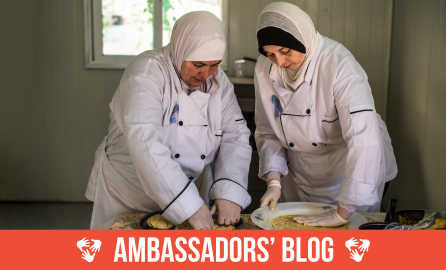I had the chance to conduct my research with Dina Nziku, Senior Lecturer in Business and Enterprise at the University of West Scotland, and Aidin Salamzadeh, Assistant Professor at the University of Teheran. They are also the co-authors of the chapter in question, “Women Entrepreneurs in the Middle East.”
Coming from diverse backgrounds, we faced constant challenges in understanding the roadblocks and emerging opportunities encountered by women entrepreneurs in the region. Our research delved into the characteristics of women's entrepreneurship, the potential for future growth, and the interplay of cultural, social, and economic factors.
A key highlight is the importance of supportive policies, access to finance, and the development of entrepreneurial ecosystems in fostering women's economic empowerment in the Middle East.
Throughout our research, we encountered powerful stories of resilience. In Saudi Arabia, for instance, we discovered the inspiring story of Amira, a young woman from a rural village who aspired to establish her bakery. Despite facing limited access to education, which posed obstacles in navigating the business world, Amira remained undeterred. She saved money, enrolled in online courses, and eventually launched a successful business. Notably, her venture also provided employment opportunities for other women within her community.
Similarly, Fatima's tech startup in Dubai empowers women through technology training and offers affordable education for their children. Likewise, in Jordan, Lama initiated a social enterprise focused on robotic education, creating a space for children to develop creative and IT skills through experiential learning (i.e., the process of learning by doing), which the formal education system did not adequately provide.
Key determinants of low women's participation in economic activities in the Middle East
-
Lower levels of formal education in some countries: Although formal education systems have developed in most selected countries, limited access to education for women in the Middle East hampers their participation in economic activities.
-
Higher levels of domestic responsibilities: Cultural norms and expectations often burden women with household and caregiving responsibilities, consequently limiting their engagement in economic activities.
-
Lack of social networks: Women face challenges in building professional networks, accessing resources, and seizing opportunities due to limited social connections as well as religious and traditional barriers.
-
Lack of capital and assets: Women entrepreneurs struggle to access financial resources and capital to initiate or expand their businesses.
-
Lack of successful women entrepreneur role models: The absence of many visible role models and mentors can discourage women from pursuing entrepreneurial ventures.
-
Cultural factors: Societal norms and cultural beliefs may discourage women from taking risks and pursuing entrepreneurial opportunities.
Key reforms
To address these challenges and promote women's economic empowerment, several reforms have been implemented in the Middle East between 2019 and 2022:
-
Legal and regulatory improvements: Countries like Saudi Arabia and Lebanon have introduced new legislation to facilitate business startups, ownership, and financing for women-owned businesses. These changes aim to eliminate barriers and establish a more supportive environment for women entrepreneurs.
-
National development strategies: Many countries in the region, including Saudi Arabia, Bahrain, Qatar, Kuwait, UAE, and Oman, have formulated long-term national development strategies. These strategies, such as Saudi Vision 2030 and UAE Vision 2021, focus on diversifying the economy, promoting entrepreneurship, and creating job opportunities. They provide a roadmap for economic growth and development, with specific initiatives to support women entrepreneurs.
-
Access to finance: Banks and financial institutions have relaxed collateral requirements and introduced creditworthiness evaluation schemes that are more inclusive of women entrepreneurs. Additionally, venture capital funds have been established to support female entrepreneurship and provide funding for innovative startups.
-
Entrepreneurship and skills development: Governments and organisations have invested in entrepreneurship and skills development programmes for women. These programmes offer education, training, mentoring, and networking opportunities, equipping women entrepreneurs with the necessary knowledge and skills to succeed in business. Universities and innovation centres have also established entrepreneurship hubs and launched initiatives to promote entrepreneurship among young women.
-
Supportive infrastructure: Incubators, accelerators, and innovation hubs have been established to provide support and resources for women entrepreneurs. These facilities offer mentoring, coaching, networking, and access to funding, helping women entrepreneurs start and grow their businesses. Digital platforms and e-services have also been developed to streamline business setup processes and provide online support for women-owned businesses.
Final thoughts
Governments should develop national strategies, regulatory frameworks and policies (e.g., laws and regulations, social protection programmes, taxation, and financial access), fostering cultural systems that strengthen women’s entrepreneurship development.
Policymakers must recognise the importance of including soft skills development in curricula, especially in relation to formal and informal education. By integrating skills such as communication, collaboration, and emotional intelligence, we can empower women with the tools they need to excel in their personal and professional lives.
In addition, let’s not forget the power of role models, mentoring, and networking. Seeking out mentors who can guide women on their journey and building strong supportive networks can provide invaluable encouragement, guidance, and opportunities for growth.
International Women's Day reminds us of our progress and the work that lies ahead. I think Capacity4dev can be very instrumental in this sense, as it provides a space for development professionals to access resources, share knowledge, and collaborate. Through this platform, we can collectively work towards transforming societal norms, promoting gender equality, advancing women's economic empowerment, and so much more.
* Women Entrepreneurship in the Middle East: Context, Ecosystems, and Future Perspectives for the Region. World Scientific Publishing Co. Pte. Ltd, edited by Dina Modestus Nziku, Leo Paul Dana, Helene Balslev Clausen, and Aidin Salamzadeh. The book's approach is captivating, combining comprehensive analysis with a focus on the ecosystem's performance and showcasing selected entrepreneurial success stories from five countries: the United Arab Emirates (UAE), Israel, Lebanon, Saudi Arabia, and Qatar. Additionally, the book provides a regional overview while offering examples from other countries within the Middle East.
Photo credit: © EU, Johanna de Tessières
Disclaimer: The opinions expressed are those of the author(s) only and should not be considered as representative of the European Commission’s official position.






Log in with your EU Login account to post or comment on the platform.